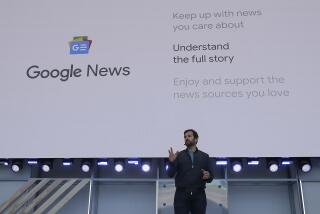It’s not journalism
- Share via
Many publishers consider the Internet, and Google in particular, a greater threat to their livelihoods than Osama bin Laden. Among those who have taken particular offense at Google are some current and aspiring newspaper publishers, including Sam Zell (who’s in the process of buying Tribune Co., owner of the Los Angeles Times), who once famously asked, “If all of the newspapers in America did not allow Google to steal their content, how profitable would Google be?”
Up to now, Google’s news site hasn’t been a moneymaker for the company, at least not directly. There are no ads on Google News, just links to stories on websites run by newspapers, magazines and other news outlets. Those links prompt people to spend more time on the news media’s sites, potentially increasing their ad sales.
But Google now is doing yet another thing that’s bound to get under journalists’ skin. This month, it announced plans to let people and organizations comment on the stories written about them. For example, if The Times ran another exposé on conflicts of interest within the Food and Drug Administration’s drug-approval process, Google News would provide a forum for the FDA and any researchers or drug manufacturers implicated in the story to respond, unedited.
The feature implies that the stories aggregated by Google News are incomplete -- possibly because of limited space, but also possibly because of bias, neglect or ignorance. News organizations have their flaws, and the added comments on Google may demonstrate that. But Google’s effort may have a happier side effect: It may illustrate why journalism is more than just aggregating information -- and why Google News isn’t really its competition after all.
The essence of good journalism is asking the right questions. Google, however, won’t ask anything of those who submit comments. According to the company’s announcement, its only interest is that the submissions are authentic, not that they’re relevant or even truthful. As a result, the comments section is likely to be larded with spin, hype and obfuscation. A seemingly heartfelt comment may carry the CEO’s name, but the words will probably have been typed by corporate flacks.
There will be some valuable responses too, plugging holes in stories or correcting mistaken impressions. Google, however, won’t help readers separate the factual wheat from the public-relations chaff -- a reminder that Google may strive to be the world’s index, but it’s not journalism.






